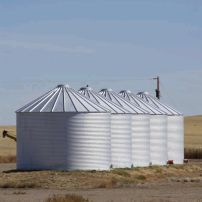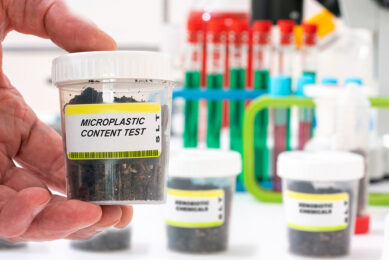New insights in grain bin monitoring

Grain moisture content and temperature are the primary factors affecting grain deterioration in storage. If these factors are not properly monitored and controlled, grain quality can deteriorate quickly due to mold growth and insect infestation.
ARS engineer Paul Armstrong at the agency’s Grain and Marketing and
Production Research Center in Manhattan, Kan., and Haidee Gonzales and Ronaldo
Maghirang at KSU have preliminary research findings showing that monitoring
carbon dioxide–along with humidity and temperature–also may help detect
problems more effectively.
Relative humidity and temperature can be used
to estimate grain moisture, while carbon dioxide levels indicate the amount of
respiration due, primarily, to molds. Current technology allows relative
humidity and temperature sensors to be placed at multiple points within the
grain mass. Carbon dioxide sensing is more feasible at an aeration duct.
Carbon dioxide sensors
In the study, sensors were
placed at different depths in the bin. High-moisture grain– comprising about 11
percent of the volume–was placed at the top of the bin and produced high
amounts of carbon dioxide, which in most cases was easily detectable during
aeration. Lowering grain temperature with aeration diminished the amount of
carbon dioxide produced, making it more difficult to detect unless the carbon
dioxide sensor was located very close to the wet grain.
Relative
humidity and temperature sensing gave good estimates of grain moisture for all
conditions, but under some grain conditions, high carbon dioxide levels
persisted for grain considered to be at safe moisture and temperature
conditions. Combining relative humidity, temperature and carbon dioxide
measurements gave reasonably accurate measurements of grain moisture content as
well as overall storage conditions.
[source:
ARS]
Join 26,000+ subscribers
Subscribe to our newsletter to stay updated about all the need-to-know content in the feed sector, three times a week. Beheer
Beheer









 WP Admin
WP Admin  Bewerk bericht
Bewerk bericht